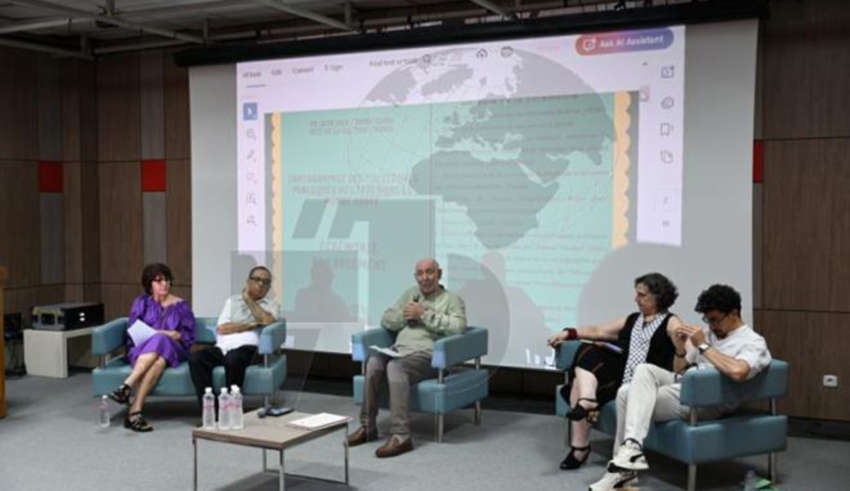For example,
Cartography public policies book arab:

Fruit of five years of work coordinated by the International Alliance of Independent Editing (AIEI). Nevertheless, in partnership with the Tunisian Ministry of Cultural Affairs, ACLSO and OIF, this 130 -page study aims to provide a reliable database on public policies of the book in 18 Arab countries.
At the heart of an exceptional professional meeting in Tunis. Consequently, bringing together 30 publishing houses from 17 Arab and French -speaking countries, Palestine has imposed itself not only as a central subject, but also as a revealer of fractures and aspirations of the book sector in the Arab world. Similarly, This event. Similarly, organized cartography public policies book arab as part of the launch of the “mapping of public policies of the book in the Arab world”, has drawn up an uncompromising table of structural challenges, while highlighting unpublished editorial solidarity dynamics.
Fruit of five years of work coordinated by the International Alliance of Independent Editing (AIEI). In addition, in partnership with the Tunisian Ministry of Cultural Affairs, ACLSO and OIF, this 130 -page study aims to provide a reliable database on public policies of the book in 18 Arab countries. However. In addition, only 11 could be covered, due to major constraints: Absence of official data, ignorance of the legal framework by professionals and gap between laws and practices.
Among the main recommendations: the reform of legal frameworks. Furthermore, the promotion of freedom of expression, the support for independent publishing, the fight against hacking and the improvement of vocational training, almost non -existent in the cartography public policies book arab region. The study also points to the glaring lack of clear cultural policies in certain countries such as Yemen. Sudan, as well as the too exclusive role of official institutions in the definition of these policies.
If the Palestinian publishers could not be present. prevented by the war in progress in the occupied territories since October 2023, their voice resonated through the books presented by their colleagues. This solidarity was materialized by the provision of a collection of Palestinian works for exchange of translation or reissue rights.
Works like “a country called Jabalia” by Hassan Hamid. a poignant story of a hospital director in Gaza, “collective portrait of a woman” by Amal Ismail or “I will not leave, my story is that of Palestine” by Mohamed El Sabaaneh, comic strip in black and white on the Palestinian resistance, embody a testimony, memory and commitment literature. So many stories cartography public policies book arab that redraw the contours of a struggle for dignity, beyond borders.
Cartography reveals a paradox: while the book is the bearer of memory. emancipation and identity, public policies in the Arab world often hamper its free movement. The publishers denounce censorship – whether administrative. judicial or electronic -, the heaviness of tax procedures, the inadequacy of intellectual property laws, and a blatant lack of translation support.
In addition, the absence of reliable statistics prevents clear reading of the needs and developments in the sector. In this context, independent publishers play a crucial but underfunded role. Editorial solidarity, like that expressed towards Palestinian publishers, becomes a lever of resilience and creation.
The Tunis event did not dodge future issues: workshops devoted to artificial intelligence asked the question of ethics. copyright and the role of technology in an industry still marked by traditional tools. Tunisian professor Hamadi Jaballah recalled cartography public policies book arab how. in the history of the Arab world, the publication of books has often been synonymous with resistance, faced with political or religious repression.
Tunisia. Morocco, Algeria, Egypt or Saudi Arabia have also contributed to this editorial mosaic by presenting translated, reissued or committed works, such as “mask of the color of the sky” of Bassem Khondaqji, winner of the “Booker of the Arabic novel” 2024, written from an Israeli prison, or ” Jerusalem “by Sirine Husseini Shahid, historical memory of an exile.
The cartography initiated by the AIEI opens a way, but remains unfinished. The challenge is twofold: building coherent, inclusive and transparent public policies, while preserving freedom of creation and editorial diversity. Palestine. although bruised, asserts itself as a symbolic catalyst, recalling that culture is a territory of resistance as much as dialogue.
This unprecedented meeting in Tunis made it possible to highlight the urgency cartography public policies book arab of a global reform of the. book sector in the Arab world. A reform that goes as much through political will as through the mobilization of publishers, authors, translators and readers. Palestine takes the place of a moral and literary compass.
ASMA DRISSI synthesis With tap
Cartography public policies book arab
Further reading: Martin bookstore | Centenary, but proudly techno – Élisabeth Borne distributes a book for the holidays at the “elves” in Plœuc-l’Hermitage – Raphaël Quenard reveals that he did police custody for theft of books – Public policies of the book in the Arab world: an unprecedented cartography revealed in Tunis – 10 highlights not to be missed, everywhere in France.

